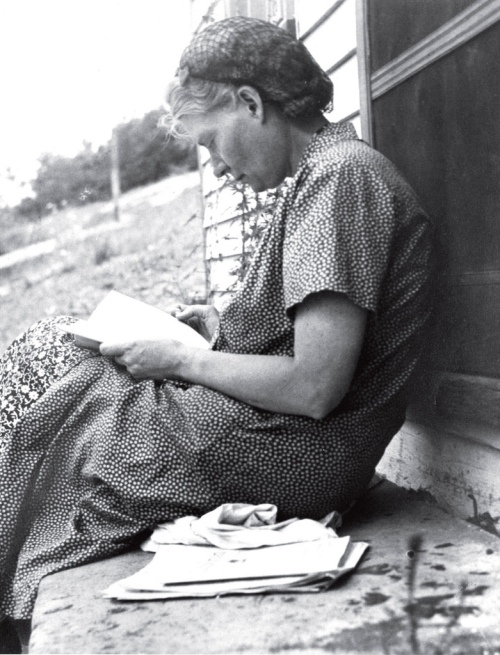The Dorothy Day Book, compiled by Margaret Quigley and Michael Garvey, is a kind of posthumous commonplace book, that is, a collection of quotations from Dorothy’s decades of reading (largely from her column in the Catholic Worker), interspersed with some of her own commentaries on her life.
As this slim volume attests, she was a voracious and vivacious reader, culling wisdom, aperçus, exhortations, and epigrams from saints (Gertrude, Teresa of Avila, Maximilian Kolbe), rabbis (A.J. Heschel), popes (Leo XIII, Pius XI, John XXIII), sages (R.W. Emerson and H.D. Thoreau), novelists (Upton Sinclair, George Orwell, Leo Tolstoy, Henry Miller), activists (Danilo Dolci, Mohandas Gandhi, A.J. Muste), literary critics (Raymond Williams), philosophers (Immanuel Kant, Simone Weil, Herbert Marcuse), monks (Roger of Taize, Thomas Merton, Thich Nhat Hanh), poets (Samuel Taylor Coleridge, W. H. Auden), prophets (Isaiah), theologians (Teilhard de Chardin, Johannes Baptist Metz), even university presidents (Theodore Hesburgh), to name but some of those cited in these pages. The entries reveal Dorothy’s preoccupations with property and poverty, war and peace, patriotism and idolatry, service and self-purification. She read newspapers and the Book of Common prayer, classic novels and the lives of the saints, social criticism and spiritual testimonies. Her practice of reading was a decades-long, spirited clarification of thought.
In their introduction, the editors quote Dorothy’s view of reading: “The books will always be there. If we give up many other distractions, we can turn to them. We can browse among the millions of words written and often just what we find can nourish us, enlighten us, strengthen us — in fact, be our food just as Christ, The Word, is also our food.”
Here is what I’ve culled from her culling and own writing …
I am done with great things and big things, great institutions and big success, and I am for those tiny invisible molecular moral forces that work from individual to individual, creeping through the crannies of the world like so many rootlets, or like the capillary oozing of water, yet which, if you give them time, will rend the hardest monuments of man’s pride. William James
Property — the more common it becomes the more holy it becomes. St. Gertrude.
A single grateful thought towards heaven is the most complete prayer. Lessing.
It is a fact, confirmed and re-confirmed during two or three thousand years of religious history, that the ultimate Reality is not clearly and immediately apprehended, except by those who have made themselves loving, pure in heart and poor in spirit. Aldous Huxley, The Perennial Philosophy.
This morning to ward off the noise I have my radio on — Berlioz, Schubert, Chopin, etc. It is not a distraction, it is a pacifier. As St. Teresa of Avila said as she grabbed her castanets and started to dance during the hour of recreation in her unheated convent, “One must do something to make life bearable!”
To teach others, it is good to speak of saints and heroes. Vinoba Bhava.
Rabbi Leib, son of Sarah, the hidden zaddik who wandered over the earth, followed the course of rivers, in order to redeem the souls of the living and the dead, said this: “I did not go to the maggid in order to hear Torah from him, but to see how he unlaces his felt shoes and laces them up again.” Martin Buber, Tales of the Hasidim.
To be a witness does not consist in engaging in propaganda, nor even in stirring people up, but in being a living mystery. It means to live in such a way that one’s life would not make sense if God did not exist. Cardinal Suhard.
[Father Hugo] also said that we loved God as much as the one we loved the least. What a hard and painful thing it is to love the exploiter.
St. Teresa wrote of the three interior senses—the memory, the understanding, and the will.
Our wishes and desires — to pass an exam, to marry the person we love, to sell our house at a good price — are involuntary and, therefore, not in themselves prayers. They only become prayers when addressed to a God whom we believe to know better than ourselves whether we should be granted or denied what we ask. A petition does not become a prayer unless it ends with the words, spoken or unspoken, “nevertheless not as I will but as Thou wilt.” W.H. Auden
To love is not to experience a particular sensation in the heart; that emotion is but a reflex phenomenon, a detail of love at the least. To love is to wish for the good, it is to give the best of one’s self for the good of another; it does not mean grasping for one’s self; love means giving one’s self. Maurice Landrieux
Let our very first act every morning be the following resolve: ‘I shall not fear anyone on earth. I shall fear only God. I shall bear ill-will towards no one. I shall not submit to injustice from anyone. I shall conquer untruth by truth and in resisting untruth I shall put up with all suffering.’ Gandhi
She quotes the mantram practice from The Cloud of Unknowing.
–September 1998
